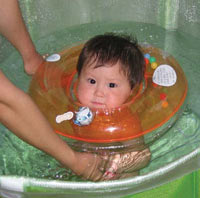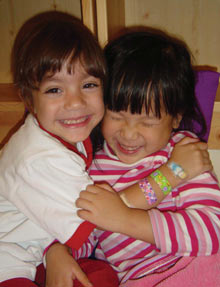| Investing in the Infant Intellectual |
| http://www.sina.com.cn 2005/06/27 17:14 thats China |
Kid gloves Children like to play. Parents worry they will hurt themselves. But this protective impulse may be damaging as well. Children know how to protect themselves, says Zhao. "When they are about to fall, they will instinctively raise their hands to keep balanced. And when their bodies hit the ground, they will use their hands to protect the face and head."Even legitimate physical concerns are rivaled by the psychological impact of limiting a child's interaction with his or her environment. The realization of this is influencing the setup of Chinese classrooms. "Everybody is free in class. The kids can walk freely, see and touch equipment in the classroom, which can stimulate brain development," says Meng Fan, an international kindergarten teacher in Beijing. She teaches 10 students aged between 1 and 3. Zhao Yongbi approves of this method. Limiting movement stunts independent decision-making, he says. "Children lose the opportunity of using their own hands. It slows their brain development." Fang Fuxi gives an example. "In America, I saw parents and a boy outside the supermarket who was holding a giant toy car. The car was so big he couldn't walk properly. "But it's his toy. He should carry it himself: That's more or less impossible for Chinese parents." Kindergarten teacher and new mother Laura Liu believes the problem is some Chinese parents "care too much." "When baby cries, they worry and rush to them at once," says Liu. "Before children are 10 months old, you should do this to give them a sense of security and build trust. "But for children over 10 months, you cannot rush to them every time they want something. It creates a situation where Chinese children suffer much more 'separation anxiety' than foreign babies." Parents often don't really know what kids need, says Yu Qinglin, general manager of Adorable Babycare Consulting Company in Guangzhou. "The only way is to spend time with your kids, observing closely what they enjoy and at what they excel." A child's natural yearning for personal space away from parents is perhaps the hardest thing for a parent to recognize and accept, says Liu. "A child is always curious and loves to explore about new things alone. Parents here like to 'help' their children when they are playing, reading or painting. That's not help at all. That's an interruption. "If you break their learning progress, they lose the opportunity to gain new knowledge and adapt to the new environment. The process of growth is the progressive acquisition of knowledge about a new world and adapting to that environment." Meng Fan draws a contrast with a 15-month-old Dutch boy who can sit and read a book for half an hour during class. "When he first came to my class he was only 11 months old, but he walked so confidently into the classroom. Not a shred of nerves. Some of the older kids were trembling the first time they came here," says Meng.
Parents "speak too much to their children," argues Meng. "'Are you thirsty?' 'Have some water!' 'Let me help you with your clothes!' Some parents of my students won't leave their kids alone for five minutes. In fact, children need their own space to concentrate on something and then they can be independent. If they really need your help, you can be sure they'll let you know." Adults often talk down to children, according to a survey by the State Council Working Committee on Women and Children reported in China Women's News. For instance, they talk about the "need to protect," children. They use phrases like "precious flower" and "small tree" to describe a child. When asked "how do you see children?" 57 percent chose "education target." "Maybe that's why children seem to yearn so much to grow up. They don't like being treated like stupid inferior creatures," says Liu Bo. Fatherland and Mother Tongue The emergence of English as a global lingua franca has introduced issues of multiple language learning into the early education fray. In China and other countries, couples face the question of when to start teaching their youngsters a second or even third language. This is a particular issue for mixed-culture couples whose children must learn the tongues of both mother and father. Back home after a long day, Tom Spearman had been looking forward to seeing his 20-month-old daughter and tried to pick her up. But Emma didn't want to be carried. The family's ayi asked her why. "Emma said, 'Baba bu dong wo (Daddy doesn't understand me),'" says Spearman. "Her Chinese is pretty good already and she often talks to me and I don't understand what she's saying. She finds this upsetting. "It's a bit of a problem. The only solution is for me to learn more Chinese. But I already find Emma is speaking to Laura and our ayi in terms of Chinese rhymes, sayings and stories and these have to be explained to me at great length. It's not the same as me understanding the words. Aiyahh!" In response, Spearman is also trying harder to teach Emma English. "It's best to establish a concept of 'mother tongue as root'," says Professor Pang Weiguo of Huabei Normal University. "After children have basically mastered their mother tongue, then they start to officially study a second language. Otherwise, they may lack a clear sense of identity or belonging." Children between 1 and 1.5 years old can listen and understand some language, says Fang Fuxi. Between 1.5 and 2 years old is a time of accelerated language learning. "So children should learn a second language as early as possible," says Fang. Other experts prefer between 2 and 6 years old as the critical time for studying mother and second languages. "Take the second language as an interest and hobby, not a duty," suggests Zhao Wenjing, assistant professor of Jinzhou Normal University. "My daughter never speaks English to me or her father, but her kindergarten teacher told me she said 'I am very happy' in English when asked 'How are you doing today?'," says Emma's mother, Laura Liu. "Children can instinctively adjust their language to different environments," says Fang. "So trying to create the correct language environment is very important." Studying a second language should be based on happiness and interest. As English becomes increasingly important to job hunting in China, parents here have been trying hard to kick start their children's introduction to the alien language, with mixed results. "Research has found bilingual children are usually smarter than other children their own age because language is a tool of thought development. And children who start studying a second language older than 12 years old basically will never become native speakers," says Fang. "It's not impossible. But it takes much more time to do it." Not every child can grow up to be an Einstein. "Actually, Einstein was slow at language, but he was a genius," says Fang. In the end, it says more about the parents than the child if junior doesn't want to study languages. "Parents shouldn't force their children to study. You have to make them want to learn it by playing games or turning actions into language." "If children are really interested in studying a second language, they can listen to a tape for an hour and a half and enjoy it very much. Most adults would struggle to do this," says Zhao Wenjing. |
| 【评论】【论坛】【收藏此页】【大 中 小】【多种方式看新闻】【下载点点通】【打印】【关闭】 |

